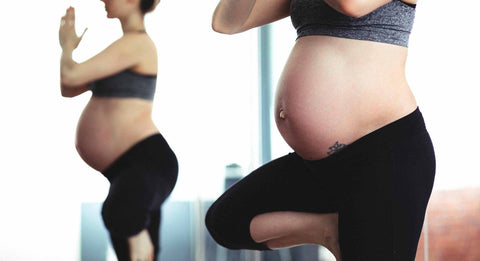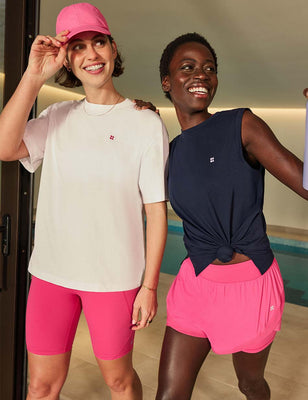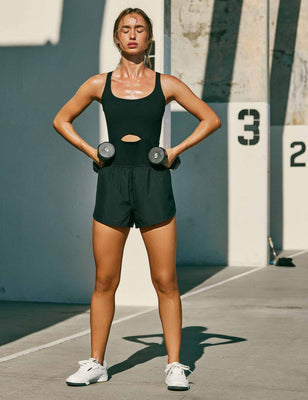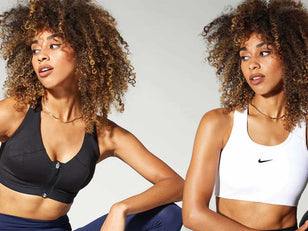
So… you’re going to have a baby! Congratulations. If you’re an active gal at heart, we bet you might have wondered; ‘but what about my workout routine’? Thankfully, becoming a mother doesn’t mean that your fitness regime has to pause for the next nine to ten months.
“Assuming that their pregnancy is all going well, it is very safe to exercise if done correctly,” explains Charlie Launder, Bumps & Burpees founder. “That baby is buried so safely in there that women don't need to be as scared as they often are.”
Needless to say, there are numerous physical and mental advantages to working out when you’re pregnant. Doing so may even boost the metabolic health of your unborn child, according to research published in the Experimental Biology journal. With that in mind, let’s take a look at five of the best activities that pregnant women should try.
Get yourself a comfy kit from our Maternity Sportswear Collection >
1. Yoga
Staying active during your pregnancy may mean trying yoga for the first time. This exercise is ideal for pregnant women since it helps boost fitness levels, increase relaxation and improve overall strength. As an added bonus, stretching exercises – such as the ones undertaken in yoga – could also lower the risk of pregnancy preeclampsia, according to a study from the University of North Carolina at Chapel Hill.
If you’re ready to embark on your yoga journey, doing some research is key. Start by searching for a pregnancy yoga class in your area. These types of sessions are wildly popular and offer the support you need when you first start out. You will also have the chance to meet other mothers-to-be, which will help you expand your social circle.
2. Strength Training
Do you lift? Moderate, supervised strength training can be not only safe but beneficial to pregnant women, according to research in the Human Kinetics Journals. Keeping your muscles toned and active when you’re carrying a child will help you stay in shape. Of course, if you’re entirely new to this practice, working with a trainer is advisable.
“Exercising while you're pregnant will help you to build up strength and support that growing bump,” says Launder. “You can put yourself in a strong position to avoid aches and pains if you keep your muscles active throughout your pregnancy. The rush of endorphins can help you to relax and feel great during the rollercoaster nine months too!”
3. Jogging
If you’re an avid jogger, you needn’t give up when you fall pregnant. This low-intensity exercise could be the ideal way to stay active. You should keep in mind that bodily changes, such as weight gain, could affect your balance. Also, exercising will get trickier as your pregnancy progresses, and so you may need to ease up as you reach full-term.
“Listen to your body,” advises Launder. “We all need to do this but in pregnancy, it’s even more important. If you feel exhausted, it’s probably your body's way of telling you it needs to rest. Now is not the time to push through tiredness, don't be afraid to take days off the gym and let your body rest.”
4. Kegels
Have you ever tried Kegels? Now might be the time to start. Practicing Kegels in the lead up to labour could mean that delivering your child is easier, according to a report from the American Pregnancy Association. The pelvic floor exercises may help to strengthen your vaginal muscles, which means that you have more mastering over them when giving birth.
Moreover, the experts also recommend that you continue to engage in these exercises after you have given birth. The main theory here is that doing so can help to undo any damage that labour may have caused. For instance, this activity could help you regain strength in your pelvic floor, avoid bladder issues and support perineal healing.
5. Swimming
For women who want to continue exercising right up until their due date, hitting the local swimming pool could be a smart move. This type of activity allows you to complete a full-body workout without putting excessive pressure or strain on yourself. What’s more, this particular exercise helps to ease aches and pains while reducing fluid retention.
“When you get towards the end of your pregnancy, swimming is a great option as it takes the weight off your feet and is kinder to your joints,” says Launder. Before you take a dip, be sure to check the temperature of the water. Getting too hot can be dangerous during pregnancy, and so you should avoid heated pools at all costs.
Conclusion
So long as your mindful and careful, exercising when you’re pregnant should be entirely safe. These low-impact activities will not only help you maintain peak fitness but also prepare your body for the trials of labour ahead of time. Why not create a pregnancy fitness schedule that suits your current lifestyle? Should you have any queries about how to protect yourself during activity, be certain to speak with your doctor or an expert.
NEXT UP
First trimester exercise: Everything you need to know >
Discover our new Maternity Sportswear Collection >






























































